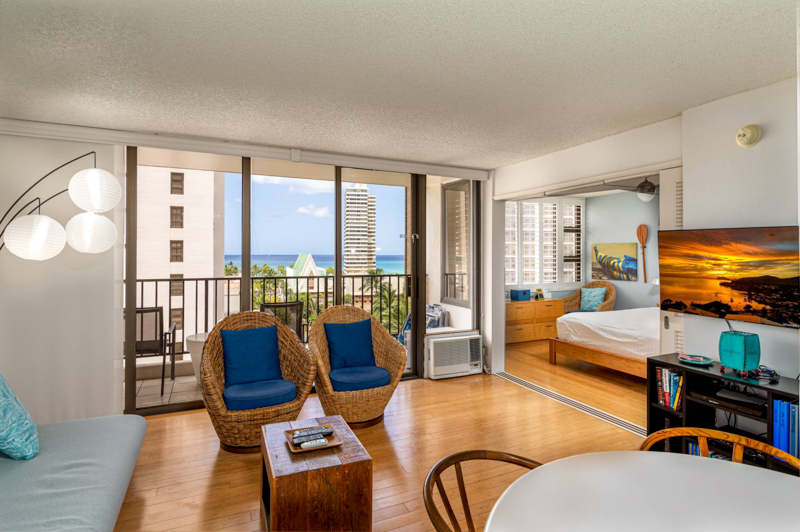Rental Property Income Taxes for O’ahu, Hawai’i: GET, TAT, and OTAT
If you own rental property in Hawai’i, you are required to pay certain taxes. These taxes vary depending on which island you own real estate on, and the taxes you pay will vary depending on whether the property is operated as a long-term or short-term rental.
This guide focuses on the taxes you’ll pay on O‘ahu rental properties in 2025, including General Excise Tax (GET), Transient Accommodations Tax (TAT), and the O‘ahu TAT (OTAT).
Tip: If you are using a full-service property management company, the company may collect and pay these taxes on your behalf, but you’re still legally responsible for ensuring they’re filed correctly

A client’s 2 BR vacation rental at Waikiki Sunset.
General Excise Tax (GET): 4%
Rather than having a sales tax, Hawaii has a GET that is assessed on all business activity. For O’ahu rental property, GET is currently 4% and needs to be paid on gross rental income and can be passed on to the tenant. It is important that you pay this tax according to your required filing frequency.
Depending on your tax liability, taxes will be paid monthly, quarterly or semi-annually. You are required to file (Form G-45) and pay the taxes no later than the 20th day of the month following the close of the filing period. You are also required to file an annual return (Form G-49). This is due on the 20th day of the fourth month following the close of the prior taxable year. For most people, G-49 needs to be filed no later than April 20th of the following year.
To learn more about GET in Hawaii, please read: An Introduction to the GET
Transient Accommodation Tax (TAT): 10.25%
If a property is used as a “transient” accommodation (short-term rental), you will be required to pay the TAT. The State of Hawai’i defines “transient” accommodation as:
“A transient accommodation is a room, apartment, house, condominium, beach house, hotel room, suite, or similar living accommodation rented to a transient person for less than 180 consecutive days.”
The TAT is levied on gross rental or gross rental proceeds, which are any amounts received by an operator in cash, goods, or services for renting a transient accommodation without any deductions for costs. If you charge guests a cleaning fee, this fee is considered income and needs to be included into your TAT calculations. TAT needs to be paid in the same timeframe as your GET payments.
Is Income Ever Exempt From TAT Taxes?
There are situations in which you may not be required to pay TAT taxes in Hawaii. If your guests meet the following qualifications, you may be exempt from TAT:
- Low-income renters receiving rental subsistence from the state or federal governments and whose rental periods are for durations shorter than 60 days.
- Living accommodations for military personnel on permanent duty assignment to Hawaii, including military persons who receive a temporary lodging allowance while seeking accommodations in Hawaii or while awaiting reassignment outside Hawaii.
- Lodging provided by nonprofit corporations or associations organized for religious, charitable, or educational purpose.
- Accommodations furnished to foreign diplomats and consular officials who are holding cards issued or authorized by the United States Department of State granting them an exemption from state taxes.
Learn More About Transient Accommodation Tax (TAT)
To learn more about the TAT and forms you need to file to open an account as well as pay the tax, please click here: State of Hawai’i Intro to TAT

A client’s 1 BR vacation rental at Waikiki Banyan.
O’ahu Transient Accommodation Tax (OTAT): 3%
The O’ahu Transient Accommodation Tax (OTAT) is currently 3%. OTAT is imposed in addition to the TAT. Taxpayers who are registered with the State and have a valid State TAT number will be deemed registered for OTAT. Taxpayers subject to the OTAT do not need to register separately with the City.
Click here to view Form OTAT-1 that you use to pay the tax.
Important Miscellaneous Info:
- Operators must display their TAT registration certificate in each room, apartment, or other transient accommodation unit being rented out. Instead of posting the certificate, you may post a notice informing the guest or tenant where the certificate may be inspected.
- An out-of-state operator is required to have a local individual or business entity on the island to assist the tenant if necessary. You must provide the name, phone number and email address of the local contact in the same place that the registration certificate or notice is posted.
- There is no statute of limitations for GET or TAT. Thus, it is very important you make the appropriate payments in a timely manner.
Key Takeaways
| Tax Type | Applies To | O‘ahu Rate (2025) | Filing Form |
|---|---|---|---|
| GET | All rental income | 4% | G-45, G-49 |
| TAT | Rentals <180 days | 10.25% | TAT-1 |
| OTAT | Short-term rentals on O‘ahu | 3% | OTAT-1 |
If you’re renting long-term (180+ days), you’ll only owe GET — not TAT or OTAT. For a general overview, read An Introduction to Renting Residential Real Property by the State of Hawaii Department of Taxation.
This information is simply provided as an overview of the taxes applicable to owning investment real estate on O’ahu. Please note that this information is subject to change and that I am not a tax advisor. It is strongly urged that you consult a qualified tax professional prior to acquiring investment property in Hawai’i in order to get the most current tax information and how it may apply to you.
Thinking About Buying an Investment Property on O‘ahu?
Looking for an investment property in Hawai’i? Contact us to learn more about buying, selling, or managing rental property in Hawai‘i. I’m here to serve you and look forward to helping you achieve your real estate goals.


Tim
February 2, 2023
You forgot to add if you have a tax exemption on your home it must be changed also. If you don’t show rental or doing business out of your house and continue to rent the state will get you for back taxes.
Bryan Vukelich
February 2, 2023
Hi Tim,
Thank you for sharing that and you are right, that would be helpful info for people to have. I’ll work on another article regarding property taxes for long term and short term rental properties. Take care
David Parker
July 7, 2023
Nice post. I am glad to read this informative post. Thanks for sharing.